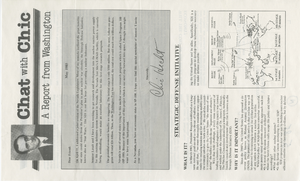Search the Special Collections and Archives Portal
Search Results

Transcript of interview with George Pollak by Claytee White, May 25, 2010
Date
Archival Collection
Description
George was raised in Mattapan, a suburb of Boston, by his mother and father. George had four siblings and was the second youngest. George shares fond memories of growing up and playing softball and tennis in the neighborhood park with his numerous friends. George could listen to a song on the radio and play it on the piano by ear when he was as young as four years old. George had several jobs to earn money growing up, including working in a record store and as a busboy. Eventually George and his brother joined a trio with Steve Harrington and performed in clubs. In 1958, George joined his brother and Paulette Richards in Las Vegas where they had a contract to play at El Rancho Hotel & Casino where they played until it was destroyed by fire. Following the fire, George and his brother parted ways and each did their own thing. In the 1960s, George began playing with the band at Caesars Palace. George used his background in accounting to do some bookkeeping and payroll for some of the ban
Text

Eric Mendoza oral history interview: transcript
Date
Archival Collection
Description
Oral history interview with Eric Mendoza conducted by Holly O'Donnell on November 29, 2021 for Reflections: The Las Vegas Asian American and Pacific Islander Oral History Project. In this interview, Eric Mendoza shares his family's chain migration history from Manila, Philippines to the United States and his difficult immigration and naturalization process once arriving in America in 1996. He talks about what brought him to live in Las Vegas, Nevada, his education and professional pursuits, what his life is like in the United States compared to that of the Philippines, and the lives of his eight siblings. Eric Mendoza discusses the historical past of the Philippines, the infrastructure in place there, and government corruption. He also speaks to Filipino traditions and festivals, food and customs, his cultural identity, and assimilating to American culture.
Text
Hooper, Robert Scott
Robert Scott Hooper, was an artist and photographer based in Las Vegas, Nevada who photographed diverse subjects over many decades. His work has been seen on the pages of newspapers and magazines worldwide, from Life to the cover of Playboy; featured on billboards, posters, postcards, phone cards and video game machines; and exhibited in galleries and private collections. He won numerous awards for his creations in graphic arts, commercial television production, advertising, print work, and even photographing a centerfold for Playboy.
Person
Grace Hayes Papers
Identifier
Abstract
The Grace Hayes Papers (1900-1989) include personal papers and financial papers pertaining to the Grace Hayes Lodge (formerly the Red Rooster), a nightclub on the Strip in Las Vegas, Nevada. The collection includes financial documents, newspaper clippings about Hayes and her family, personal correspondence, career mementos, legal documents, and photograph albums.
Archival Collection
Nevada Women’s Conference Photograph Collection
Identifier
Abstract
The Nevada Women’s Conference Photograph Collection depicts the statewide women’s conference held in June 1977 in Las Vegas, Nevada. The photographs include keynote speaker Gloria Steinem, event organizers, workshops, volunteers, and musical performances.
Archival Collection
Edith Giles Barcus Family Photograph Collection
Identifier
Abstract
The Edith Giles Barcus Family Photograph Collection (approximately 1878-1954) consists of black-and-white photographic prints and negatives, as well as postcards and photograph albums. The images depict locations in Nevada including Las Vegas, Goldfield, Searchlight, and Tonopah, in addition to locations in Arizona, California, Colorado, Massachusetts, Utah, and Mexico. Also included are images of family, friends, and associates of the Giles Barcus family. The albums contain photographs depicting the Giles family as they traveled through the southwest United States and Mexico, as well as postcards from prominent locations in the southwestern United States.
Archival Collection
Gary Guy Wilson Architectural Drawings
Identifier
Abstract
The collection is comprised of drawings (1965-1996) completed by American architect Gary Guy Wilson and/or his architectural firm, Gary Guy Wilson, AIA, Architect Studios and contains 613 sets of drawings from over 250 different projects. Primarily focused on the Las Vegas, Nevada area, the materials feature hand-drawn architectural drawings, ranging from preliminary sketches to construction documents, and a number of printed computer aided drawings. The drawings also contain work from a number of consultants, engineers, and other architects who collaborated on the development of the various projects. The drawings include: commercial and professional buildings of varying scales, such as convenience stores, hotels, casinos, shopping centers, and office developments; schools; military buildings at both Nellis and Indian Springs Air Force Bases; multi-family residential developments; and custom single-family homes located throughout the Southwest (United States).
Archival Collection


